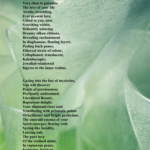Christine Miller
This post is inspired, or maybe provoked, by the recent press coverage of a new UK report called ‘Making Education Work’ which is calling for ‘A-Levels to be axed in favour of a new ‘Baccalaureate’ (Telegraph), and as the BBC declares: Education ‘fails to deliver skills for global success’.
The report has been put together by an independent 14-strong expert group including Sir Roy Anderson, former rector of Imperial College London, Sir Michael Rake, Chair of BT and head of the CBI (Confederation of British Industry) and Sir David Bell from Reading University. It was commissioned by Educational Publishers, Pearson, and is recommending a broadening of the curriculum and that so-called ‘soft skills’ like emotional intelligence, empathy, team working and other interpersonal skills are given more prominence in equipping young people effectively for the workplace.
I haven’t yet read the full report, and this piece expresses my immediate response as a provocation and encouragement to further thought and comment.
Whilst education reform might be necessary and desirable in some instances, to equip our workforce for employer’s needs and boost economic recovery, I wouldn’t like to see a system which only wants people who are fit or skilled for a limited purpose to be determined solely by business interests. To me that would be stultifying the potential breadth and depth of human beings, would inhibit the true engagement of young people, and create mind and body prisons which ultimately would not serve the values, morale and flourishing of individuals, families, communities, and nations.
Education – that political hot potato that gets thrown from party to party, government to government, a vote-winner because it’s fundamental to the values and aspirations of all of us. Education has always been one of my key concerns and I believe we miss the mark and fail to serve our young people in many ways, and that it is a subject we all need to be aware of and interested in.
But although universal, it’s not a one size fits all situation. And it’s not meant to be simply a mechanism for churning out bodies and minds with just enough skills and knowledge to supply business with willing and able fodder – ‘human capital’ – to produce its wares and do its bidding. Nor should policies change to win votes, there needs to be a consistent approach where what works is what is important regardless of which party is in power.
It’s an old and somewhat wizened chestnut, but ‘Education’ (‘educere’ in Latin) is really meant to be a process of ‘drawing out’ and fostering the individual skills and talents of each person in order that they may live a fulfilled life and be of service to their community. Given that we are all different and have a variety of abilities, natural and otherwise, which can be developed, honed and practised, any education system needs to encourage independent thinking, recognise differences and offer a range of experiences which cater to academic, practical, emotional, physical and spiritual needs and preferences. We have more opportunity to deliver a quality, varied and relevant curriculum today with the advent of technology and increased knowledge sharing than ever before.
 But let’s face facts – some people just don’t want to and are not suited to the intensity of academic study. They don’t want to pore over text books, immerse themselves in literature, conduct scientific experiments and learn periodic tables or historical dates, grid references, or biological processes. It’s still important that they should have literacy and numeracy in order to thrive, but the basic failure in these skills, if it occurs, happens much earlier in the system than at ‘A’ level, and needs to be addressed in a timely manner with understanding and specific interventions.
But let’s face facts – some people just don’t want to and are not suited to the intensity of academic study. They don’t want to pore over text books, immerse themselves in literature, conduct scientific experiments and learn periodic tables or historical dates, grid references, or biological processes. It’s still important that they should have literacy and numeracy in order to thrive, but the basic failure in these skills, if it occurs, happens much earlier in the system than at ‘A’ level, and needs to be addressed in a timely manner with understanding and specific interventions.
The more practical type of person might want a big picture overview, a general knowledge, of the way all these disciplines work in order to better understand their place in the world, but they would rather build something, create something, get their hands dirty, than read about it. They have ‘doing’ skills which are critical to our world, and need to be nurtured, encouraged, and valued, equally.
I know I have always marvelled at the spatial visioning abilities of people who build things to work out how the pieces all fit together. I have watched in awe as carpenters, bricklayers, plasterers and other talented tradespeople read and interpret plans or listen to instructions, and turn them into real structures and objects before my eyes.
And I know, also, that others watch with awe as academics, researchers and people like myself write reports, novels, articles, poems and weave arguments, conclusions, revelations and patterns of words together in a way that seems to defy possibility to those who are not inclined in the direction of word-smith, analyst or poet.
Some people are deeply engaged and interested in studying the theoretical complexities of how the world works, relish academic study and excel in that world. They need a different kind of nurturing, an education which allows their intellect to blossom and expand, to bring forth solutions and inventions, and their requirements demand a different style of teaching, a stimulating environment which values their skills and abilities as seekers of ideas and creative inspiration.
We need to remember that no one particular style, inclination or talent is superior to another, although in the past, practical skills have been undervalued. We are all, with our biases and complexities, essential components of a world which is constantly changing. Our human needs for love, caring, connection and relationship do not change, though. Whatever form of education we experience, we cannot do it in a vacuum – we do need those skills of listening, understanding, respecting, trusting and sharing as a team which bring personal and professional success and fulfilment.
So in equipping our young people for their lives and for the workplace – (and who knows exactly what the workplace may look like in the future) – we need to cater for the diversity of the whole person in the ways we do the following:
-
-
- Respect and celebrate difference
- Value individual skills and learning styles
- Foster existing aptitudes and preferences, while encouraging new ones
- Recognise the unconventional, the disrupters and change makers
- Create safe spaces with loving, listening and caring teachers for experimentation and mutual cooperation
-
Then and only then can we say we are advancing education and serving our young people adequately and effectively,
equipping them for life and not merely a living.
Christine Miller
© All Rights Reserved
More thoughts on Education & Young People:
How to Fail Your Way to Success
Teens, Troubles, Treasures










